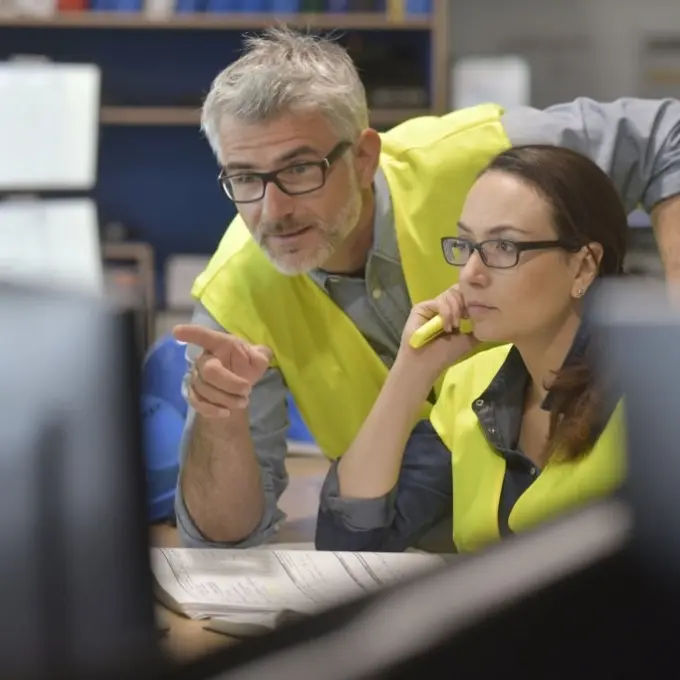-
10 Jun 2024Power and RenewablesEnhancing process optimization with control loop performance monitoring
-

Maxym Lachance, P.Eng.
Senior Engineer, Process Control and Operational Technology
-
-
06 Dec 2023Power and RenewablesDeveloping a reliable mining decarbonization plan
-

Dave Olsthoorn, P.Eng., M.A.Sc.
Engineer, Energy and Air Quality
-
-
12 Jul 2023Power and RenewablesPurposeful planning for mining decarbonization
-

Dave Olsthoorn, P.Eng., M.A.Sc.
Engineer, Energy and Air Quality
-
-
14 Dec 2022Power and RenewablesImplementing a production management and monitoring system: The importance of preliminary studies
-

Branko Radulovic, P.Eng.
Senior Engineer, Operational Technology and Infrastructure
-
-
28 Nov 2022Power and RenewablesReverse osmosis: A reliable technology
-
-
Power and RenewablesHigh-voltage substation digitalization
-
12 Apr 2022Power and RenewablesBringing data science to wind energy, driving the energy transition forward
-
-
02 Dec 2021Power and RenewablesMetal powder production: OHS risks first!
-

Benoit Desjardins, P.Eng.
Senior Engineer, Operational Readiness and Commissioning
-
-
23 Nov 2021Other industriesIACS risk assessments are a must!
-
Emerging Technologies
One of the biggest challenges for industrial companies is the enormous amount of technology available on the market. Many are attracted by the promising benefits, but often struggle to find their way through the sea of information. Incorporating technologies into sustainable solutions can also be challenging, but it can be done using a sound risk-management approach. In fact, many of the technologies that were considered “emerging” a few years ago are now standard industry practice.
Emerging Technologies
-
Your challenges
-

Think of new technologies as your allies
You must have reliable and robust operations. That’s why you invest time and money in maintaining them and making sure they continue to develop. So, it’s important to get the most out of new technologies and gain better insight into your operations by using and leveraging your data. This way, you can continuously improve your productivity.
Another major challenge in technological development is finding qualified workers and lowering health and safety risks. Technology can help you minimize worker exposure to hazardous processes and significantly lower your operational risks, like equipment failures or production losses.
Improve the value of your data with artificial intelligence (AI)
Speed up your projects with augmented and virtual reality
When effectively integrated into the design and operational model, new technologies can reduce costs and speed up project development. This allows our experts to optimize constructability, perform rigorous design reviews, provide training and virtual site visits, and much more.
Get highly accurate data using drones
Our teams use drones, agile tools that are easily deployed, to quickly understand ground features and to get to locations that are hard to reach or have health and safety risks. They can also use drones to help support you by incorporating them into your business processes. A few applications: highly accurate imaging, multispectral imaging, photogrammetry and volume calculation, inspection and measurement, and 2D and 3D geo-referenced videos.
Leverage a digital work environment
When our experts incorporate digital work environments into their methodology, so-called digital twins, they can use them to add value to your project. This applies both at the design stage and in the longer term, during operations. A few applications: remote plant visits, location training for new employees, health and safety training, predictive analysis, simulation and operational monitoring.
Optimize your operations with autonomous solutions
We can assist you in selecting, designing and specifying the required infrastructure and solutions right through to their integration into the operational model. We’ll assess the impact of automating operations to minimize health and safety risks, reduce process variability and increase equipment productivity.
-

Get highly accurate data using drones
Our teams use drones, agile tools that are easily deployed, to quickly understand ground features and to get to locations that are hard to reach or have health and safety risks. They can also use drones to help support you by incorporating them into your business processes. A few applications: highly accurate imaging, multispectral imaging, photogrammetry and volume calculation, inspection and measurement, and 2D and 3D geo-referenced videos.
Leverage a digital work environment
When our experts incorporate digital work environments into their methodology, so-called digital twins, they can use them to add value to your project. This applies both at the design stage and in the longer term, during operations. A few applications: remote plant visits, location training for new employees, health and safety training, predictive analysis, simulation and operational monitoring.
Optimize your operations with autonomous solutions
We can assist you in selecting, designing and specifying the required infrastructure and solutions right through to their integration into the operational model. We’ll assess the impact of automating operations to minimize health and safety risks, reduce process variability and increase equipment productivity.
-
-
Our approach
-

BBA’s approach to managing risk and generating value quickly
Our teams understand how important it is to consider every aspect that may influence the implementation of a new solution. They consider operational risk management, integration with existing equipment and processes, cybersecurity, health and safety, and the people involved in adopting the technology.
Our experts use an iterative methodology to support you in your proof of concept and help you achieve your goals quickly. By generating value at every stage of your project, we help you leverage and progressively improve the technology for broader development. We have viable, scalable and sustainable solutions.
-





